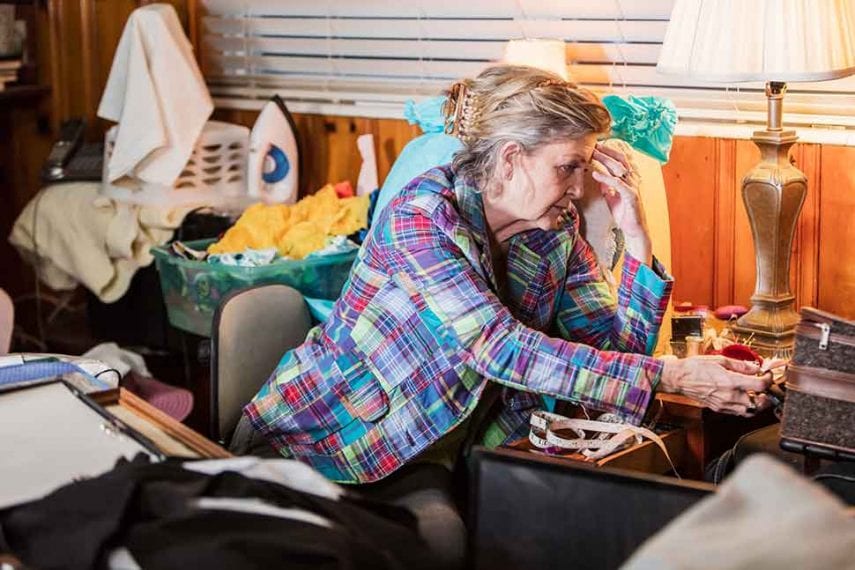How Obsessive Compulsive Disorder and Hoarding Are Related

Obsessive-compulsive disorder (OCD) and hoarding can co-occur causing severe distress, anxiety, and unsafe living environments. OCD is a mental health disorder that affects how an individual thinks, their thoughts become obsessive causing negative and persistent urges. An individual with hoarding disorder feels the need to save possessions, often worthless possessions like trash, causing severe anxiety and distress at the thought of discarding those possessions, ultimately causing a very unsafe living environment. Receiving treatment in a residential facility is the best option to help patients address all aspects of these co-occurring mental health disorders, and learn to manage them and live a healthier, happier life.
The mental health condition obsessive-compulsive disorder (OCD) causes individuals to have unwanted obsessive thoughts and urges that are negative and persistent. Unfortunately, OCD is also a colloquialism for people who are perfectionists or focused on cleanliness, undermining this mental illness. Individuals who truly have OCD have a mental health disorder that has no cure; this disorder is highly distressing and can be debilitating. A fear of germs, being superstitious of lucky or unlucky things, a fear or forgetting to do things like turn off the stove, or unwanted taboo thoughts are all common symptoms of OCD. Fortunately, therapy and medication can help someone learn to manage their thoughts and control their obsessions.
An individual diagnosed with hoarding disorder will keep items that another person would perceive to be worthless. Those suffering from hoarding have a hard time parting with or discarding their possessions, causing an enormous amount of clutter that affects daily life. Unlike OCD, hoarding thoughts happen in the normal train of thought, they are not repetitive thoughts. An individual suffering from hoarding may believe that an old piece of food trash will be useful at some point in their life so they must not discard that piece of trash, even if it is years old and rotten. A person may be driven to possess a certain item, to the point of obsession, if they do not own said possession this can cause severe anxiety. Someone with hoarding disorder may become attached to certain personal possessions, causing anxiery, grief, or anger at the thought of getting rid of the item.
How Can OCD and Hoarding Affect a Person’s Life?
Mary has been diagnosed with obsessive-compulsive disorder. That was years ago. It was no big surprise. She had her kids. She lived a life. That was years ago. But this is now.
Mary’s negative thoughts about herself and her surroundings have begun to limit her ability to socialize and interact with others, including her own children, who have been gravely concerned about both her mental and physical health. Although Mary has done her best to isolate herself, her family has discovered she is now hoarding.
Mary has anxiety and feels very upset at the thought of discarding a personal possession—she believes something dreadful will happen. Although Mary is physically capable of discarding things, her emotional, obsessive thoughts are preventing her from getting rid of things that are no longer needed. When her adult son Adam came to visit her he was beyond shocked by all the possessions and clutter in her home, and he felt fear—he felt he had no control—he felt he was watching his mother slowly slip away, the person he loved most in the world, and he didn’t know how to help. He approached his mother and suggested he helped clean. Mary objected saying that the items on the floor are contaminated so no one should touch them.
Eventually, with the help of his sisters, they were able to enter their mother’s home and realized that the amount of stuff she had accumulated made the house unsafe and truly unliveable. The floors were covered with trash, and the counters stacked high with more clutter and garbage.
There were many items that the children did not understand why their mother kept. Old catalogs from years past, rotten food wrappers from months prior, and although Mary was only feeding herself, certain food items were bought in unnecessary multiples. The siblings soon realized that their mother had OCD with a hoarding problem; their mother had a distorted way of thinking. Helping their mother was beyond their reach, and they needed professional help.
Begin Your Recovery Journey.
877-727-4343The Benefits of Residential Treatment for OCD and Hoarding
Treating obsessive-compulsive disorder and hoarding on their own is hard enough, but treating these co-occurring disorders together requires a truly personalized treatment plan. Without treatment, both disorders can cause severe distress, create an unsafe living environment, and have the potential to completely take over an individuals life.
Adam sent Mary to a residential treatment center that specializes in treating OCD and hoarding, he knew this was the best option to help his mother. While in residential treatment you can expect a customized OCD treatment plan tailored to your exact needs, a professional mental health clinician will examine all symptoms to address each disorder separately and how they act as co-occurring disorders. Patients will learn tools to help prevent future relapses with hoarding and to manage their obsessive thoughts.
One of the main reasons Adam choose a residential treatment center was family programming. It was extremely upsetting for Adam and his siblings to see their mother suffering but not know how to help her. Family therapy sessions and support groups consisting of people who have gone through this with success were both a major benefit to Adam.
Mary was set up for success in residential treatment. She was in a safe and supportive environment designed for recovery. With the help and support of her licensed therapists and peers, Mary recognized her obsessive-compulsive disorder and hoarding and was able to learn coping strategies to live a healthier, safer, and happier life.
Bridges to Recovery offers comprehensive treatment for people struggling with mental health disorders as well as co-occurring substance use disorders. Contact us to learn more about our renowned Los Angeles programs and how we can help you or your loved one start on the path to lasting wellness.






